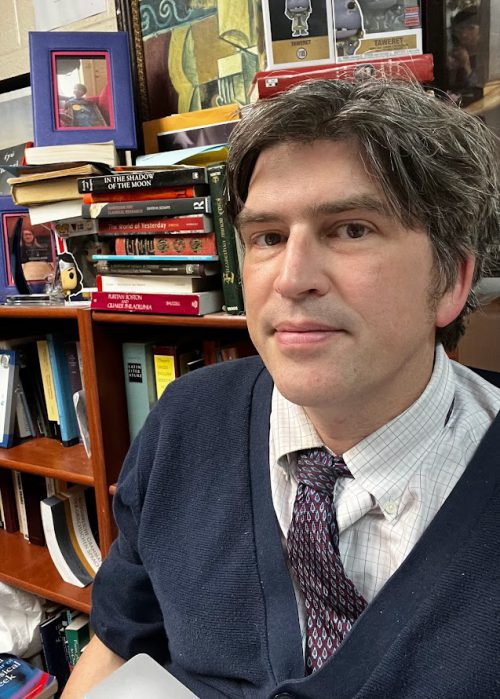Featured Image: Dr. Benjamin S. Haller shares his views on VWU’s language program. Benjamin Haller | Courtesy
The last few years have been especially difficult for the budgets of universities and colleges nationwide. Unprecedented conditions, such as the COVID-19 pandemic, have put financial strain on these institutions. To compensate for these hardships, many universities have cut part or all of their foreign language and liberal arts programs.
Most notably, West Virginia University has recently crept its way into the headlines of some of America’s most popular newspapers, such as The New York Times and Washington Post for its shocking response to financial hardships – to get rid of all of its foreign language programs.
This follows a 36 percent decrease of state appropriations for West Virginia University over the last ten years, contributing to a roughly 50 percent increase in West Virginia University’s debt over the same amount of time, as found by the Chronicle of Higher Education.
State universities like West Virginia University rely on partial funding from the state to keep tuition costs low and programs running during times of decreased enrollment, but the amount of funding for universities coming from state legislatures has decreased dramatically over the last 10 or more years, the National Education Association shows. State budgets have tightened over the last decade, and it is not unusual that it is education that suffers when it comes time for budget cuts.
“I think that states facing their own budget deficits target education for two reasons,” James T. Moskowitz, lecturer of Political Science at VWU, said.
“[First], colleges and universities can theoretically compensate for a loss of state funds by raising tuition (charging the users), and they can (again, theoretically), also compensate by taking in more out-of-state students who pay higher tuition rates. [Second], education budget cuts are sometimes the lesser evil. Cuts in other areas of state spending, like Medicaid, would be amplified because those funds are matched by federal funds,” Moskowitz said.
Within both public and private schools facing budget cuts, there’s also a trend of certain fields (such as the arts and humanities) suffering more than others. Benjamin S. Haller, associate professor of Classics at VWU, said these decisions “seem symptomatic of a quixotic tendency to commercialize academia,” which is often followed by the prioritization of more profitable fields, such as business.
“I love Business as an academic discipline—my father worked his entire career in Healthcare Finance, and many of the faculty in our Business program are friends—but universities, like museums, libraries, archives, schools, symphonies and operas, are not businesses, and do not exist for the purpose of profit. They are cultural institutions,” Haller said.
Haller spoke of the direct benefits of language studying for a student, such as increased job opportunities and the possibility of higher test scores, and how a liberal arts education and experience in a foreign language teaches students about their values and roles within a society.
Haller said “the additional lifetime earnings of a bilingual worker can be as much as $128,000,” and, additionally, “88% of job recruiters say speaking more than one language is critical to business success.”
He elaborated on benefits that even ancient languages may bring to a student, citing information from the Society for Classical Studies which demonstrated that “the benefits of studying Latin and Greek extend far beyond the skills in language, writing, reasoning, textual analysis, and fluency in important authors and history.”
Despite the great value of these benefits, Haller does not believe they are the only reasons for teaching foreign languages.
“The true value of language study, however, relates to how we understand the nature of a Liberal Arts education,” Haller said. “We can and should be ensuring our students get jobs. However, jobs are only part of the story. When we think of college simply as vocational training, we miss the reason we as a society cannot afford to do without our Liberal Arts institutions.”
Haller revisited the importance of language learning on individual societal contribution. “Through language study, [students] gain the confidence, resourcefulness and mental agility to learn from other humans,” Haller said.
It is not just teachers who hold concerns about threats to university foreign language programs. First-year Stephanie Clark shared worries regarding the strong ties between culture and language. “[Restricting language education] blocks out the ability to learn more about other cultures,” Clark said. “This can also cause some issues in our foreign politics.”
Clark said, “When we take away our opportunity to learn other languages and cultures, it makes us less [receptive] to listening to others about political agreements.”
Clark pointed out that English is not the only language spoken worldwide, and is even becoming less prominent in America as the number of Spanish speaking people grow.
“Choosing to take away [programs about] other languages and cultures simply for [financial] purposes is ignorant,” she said.
English’s worldwide prominence has become evident in language programs all over the world.
Lara Koenigsdorff, an exchange student from Germany spending the semester at VWU, shared the prominence of English education in the German school system and German foreign language requirements.
“[German students] are taught [English] from [the] first grade on. Other languages, mainly Spanish and French, you can choose…in the seventh or eighth grade. If you want to achieve the Abitur (equivalent to high school diploma), you need to have at least two foreign languages,” Koenigsdorff said.
Koenigsdorff said she has plans to graduate and become an English teacher upon her return to Germany. She therefore regards foreign language education very highly, and is concerned to hear about the potential decrease of its accessibility. “[It’s] a really important subject and can help students a lot in their jobs and their lives,” Koenigsdorff said. “Languages are useful and enriching to learn.”
To the assurance of many, the language and liberal arts programs at Virginia Wesleyan are well-protected. “We are fortunate here to have President Miller and the administrators who share a vision of the university which is strongly grounded in the Liberal Arts,” Haller said.
The foreign language programs connect to every aspect of VWU’s community, from cultural awareness to curriculum development.
Haller also noted that the Self Study (which VWU’s Classics program recently completed alongside Jeffery Henderson at the Society for Classical Studies) “shows a strong pattern of steady growth in enrollments across the past fifteen years.”
Just because language and liberal arts programs are safe at Virginia Wesleyan does not mean this concern is irrelevant to the Marlin community. Many students want to further pursue their education at other schools, the programs of which may not be as secure. The future is never completely certain, and risks towards these programs must be constantly assessed.
“Faculty and students have to be ready to stand up for the idea of the university and the liberal arts at times when universities do begin to tighten their belts,” Haller said.
He said that faculty may protect these programs by being “courageous in supporting [their] colleagues’ enterprises, and have faith that together, the faculty will keep the Liberal Arts here – including our language programs – strong.”
Moskowitz emphasized that when the program cuts are due to financial hardships caused by decreased state funding, the main line of defense becomes students.
As a way to help protect these programs, Moskowitz said to vote for candidates in the upcoming general elections who have shown their priorities lie with education.
By Avery Belisle

